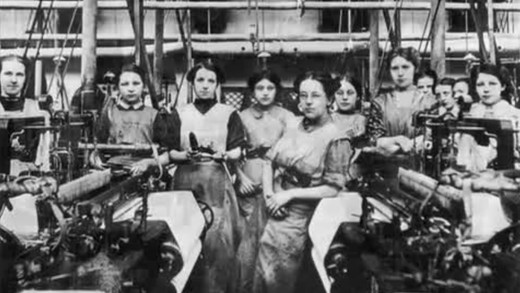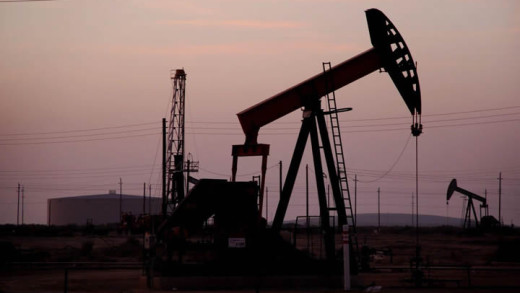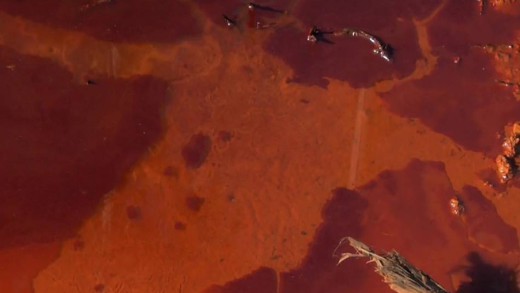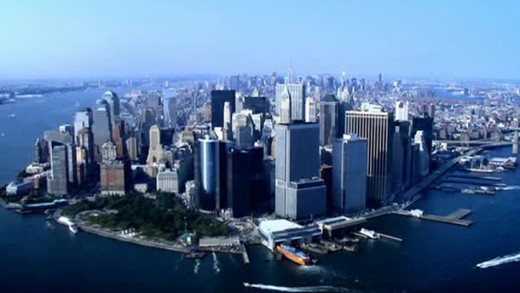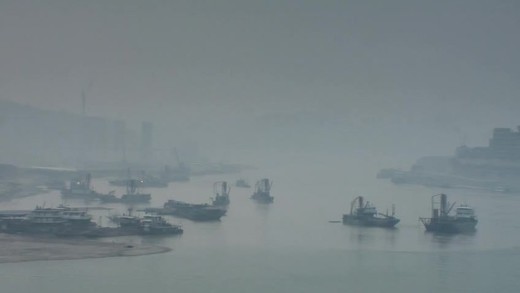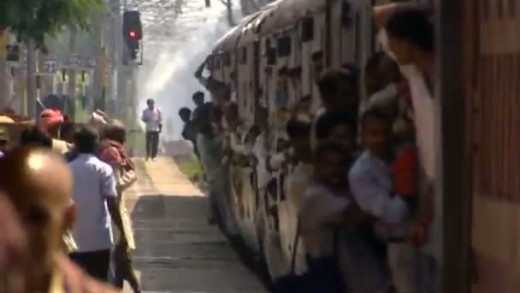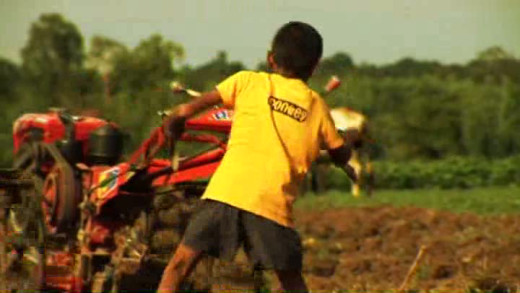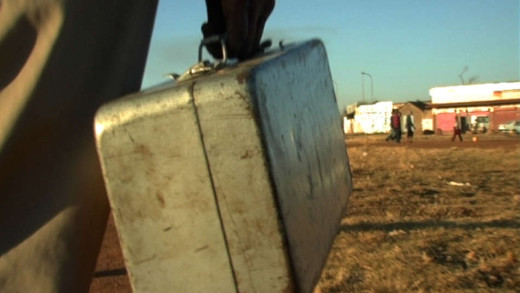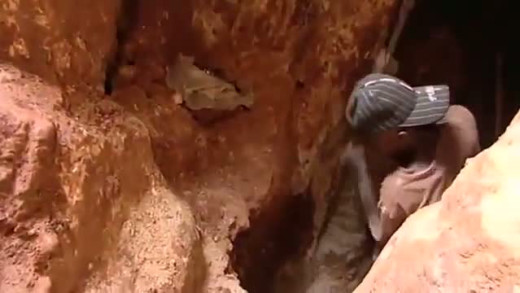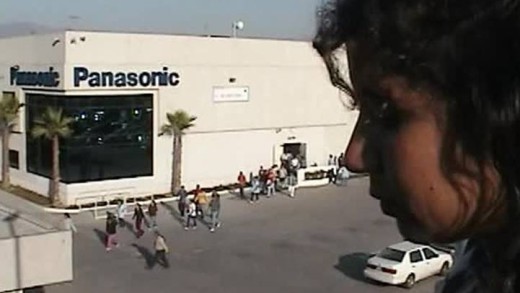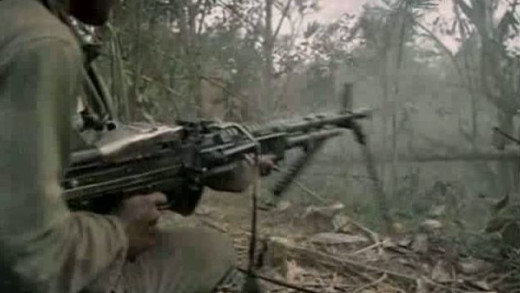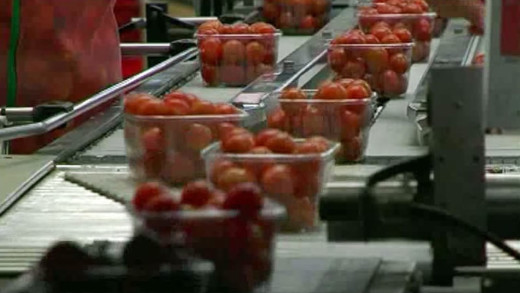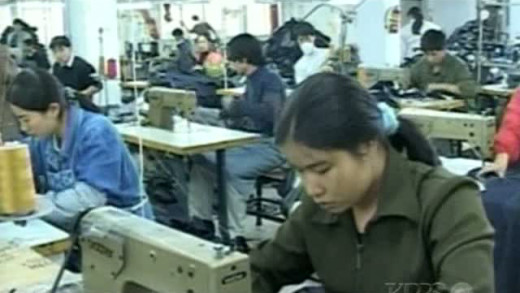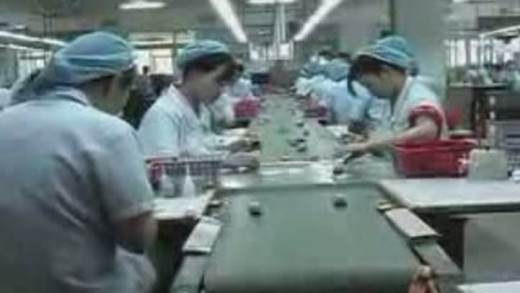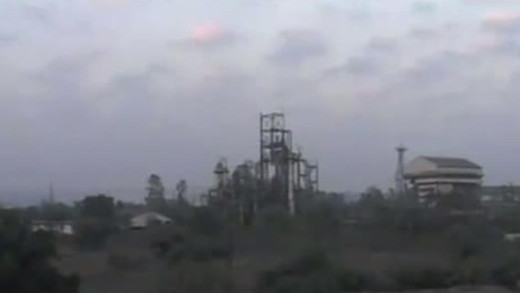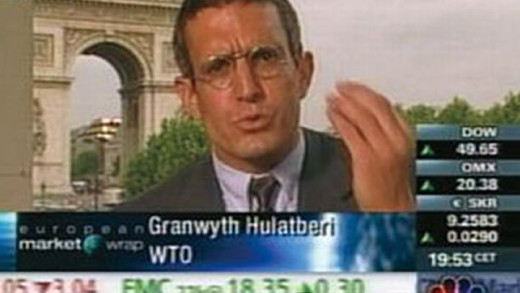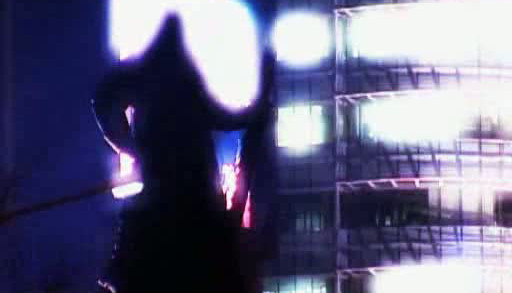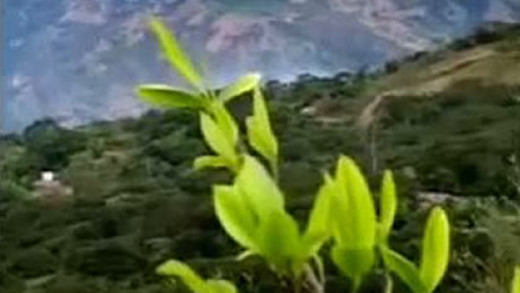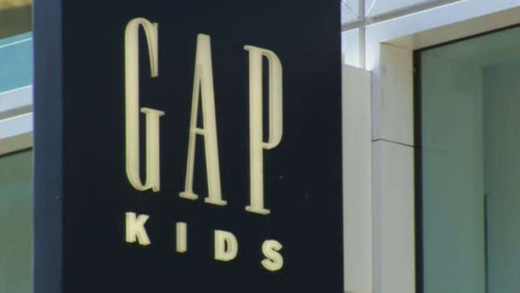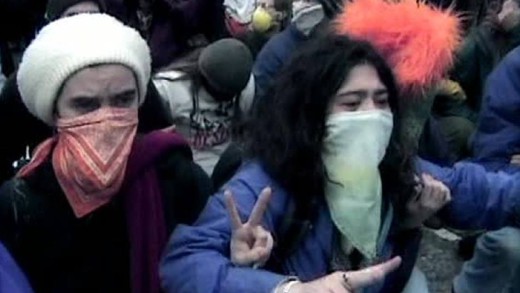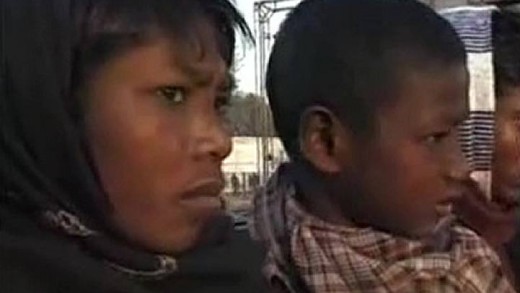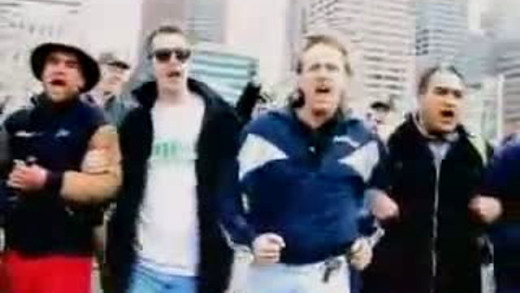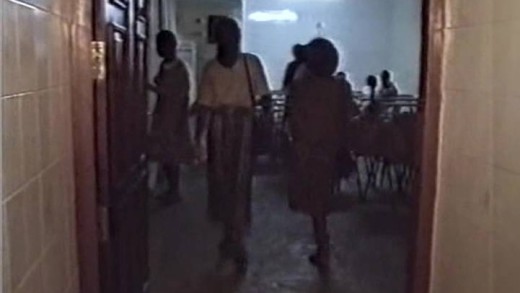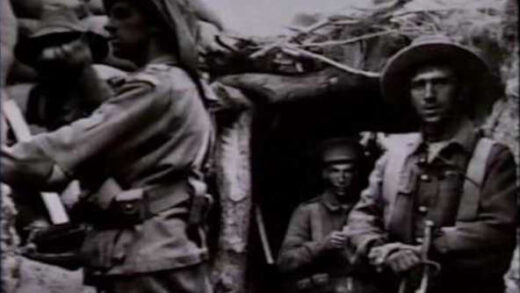Corporations On Trial is a five-part series following just some of the many lawsuits being brought against multinational corporations for war crimes, conspiracy, corruption, assassinations, environmental devastation and payments to terrorists. Such serious charges have forced some of the world's largest companies to hire high-profile defence lawyers to protect public relations in cases often brought by plaintiffs who are barely literate. These five films reveal a growing anxiety about the power and influence of big business, as many multinational corporations have annual revenues greater than some countries' national budgets and indeed increasingly hold governments to ransom by their economic power. Around the world, ordinary people are fighting back and asking how many more times their interests should be sacrificed for corporate greed and shareholder profit...
The End of Poverty? traces the growth of global poverty back to colonisation in the 15th century to reveal why it's not an accident or simple bad luck that there is a growing underclass around the world. Featuring interviews with a number of economists, sociologists, and historians, the film details how poverty is the clear consequence of free-market economic policy which has allowed powerful nations to exploit poorer ones for their assets, turning the money back to the hands of the concentrated few. This also follows on to how wealthy nations--especially the United States--thereby exert massive debts, seize a much disproportionate exploit of the natural world, and how this deep imbalance has dire consequences on the environment and on people...
Energy War considers the continuing geopolitical consequences of the dependency on fossil fuels into the future. In the struggle for the last of the resources, countries all over the world are forced to further strategise and make strange alliances. Using the gas conflict between Georgia and Russia and the position of Saudi Arabia, Energy War travels through international markets for energy and asks: If oil and gas are scarce and expensive, where will countries turn to keep their economy going and their population warm and happy?
A new gold rush is sweeping through the Amazon rainforest where scores of people are bustling in to hunt for the last nuggets and specks of gold. This insatiable rush is perpetuating the further destruction of one of the largest remaining tropical forests in the world; bringing with it weapons, mercury, crime and alcoholism, and turning once pristine creeks and rivers into dumping grounds for mining. In the forest also lies the story of the Wayanas, a Native American tribe from Guiana, who are being poisoned by the mercury releases from the mining. Their communities are enduring one of the world's worst globalisation disasters, fighting back against all odds.
For millions of people, the global economic collapse has generated curiosity about how money systems actually work, as opposed to how they're portrayed, especially when so many financial pundits seem to be baffled. In The Ascent of Money, economist Niall Ferguson works through some history that created today's money system, visiting the locations where key events took place and poring over actual ledgers and documents, such as the first publicly traded share of a company. Viewed with a critical eye, this series aims to show how the history of money is indeed at the core of civilisation, with economic strength determining political dominance, wars fought to create wealth and individual financial barons determining the fates of millions.
Up the Yangtze
Up the Yangtze focuses on the people affected by the building of the Three Gorges Dam across the Yangtze river in Hubei, China. Countless ancient villages and historic locales will be submerged, and 2 million people will lose their homes and livelihoods. The theme of the film is the rapacious transition towards consumer capitalism from a traditional farming and peasant-based society...
Child Slavery
Around 8.4 million children around the world are enslaved today. Child Slavery travels across three continents, focusing on five children and their stories...
Filmed in Thailand and the Philippines in July 2007, Squeezed tells the story of how free trade agreements and globalisation are changing the lives of millions of people living in the Asia-Pacific region with APEC. Featuring interviews with farmers, workers and slum-dwellers, the film travels across the landscapes of Asia, from the lush rice paddies of Thailand to squatter settlements perched on a rubbish dump in urban Manila. Documenting these contrasts and contradictions, Squeezed accounts the impact of globalisation...
The Big Sellout reveals the reality of privatisation and globalisation by examining the corporate takeover of basic public services throughout the world, such as water supply, electricity, public transportation, and public health care. In South America, Asia, Africa, but also in Europe and the United States, filmmaker Florian Opitz talks to the architects of the new economic world order, as well as to ordinary people who have to deal with the real direct effects. The result is a tapestry of narratives the world over that show where the dogma of privatisation cames from, who profits from it, what societies lose, and why resistance is so important.
Blood Coltan travels to eastern Congo, where a bloody war is happening over a precious metal called Coltan—a raw material used in electronic devices such as computers, televisions and mobile phones. The demand for Coltan is driven by the west, funding the war in Congo between rebel militias and children as young as ten who work the mines hunting for this precious material of the technocratic age...
In Mexico, 'maquiladoras' is a word used to describe the sort of factories that have become commonplace with globalisation—mass assembly and manufacturing plants primarily staffed by women for low wage and long hours in unsafe and toxic conditions. Tijuana has attracted so many such factories that it has gained the nickname Maquilapolis. Delving into the landscape of this, this film asks the question: What is the human price of globalisation? Maquilapolis brings American and Mexican-American filmmakers together with Tijuana factory workers and community organisers to answer that question and tell the story of globalisation through the eyes and voices of the workers themselves. The result is a film to inform and inspire, as each day the workers confront labor violations, environmental devastation and urban chaos...
We
We is a visual essay exploring the politics of empire, war, corporate globalisation, imperialism and history; using the words of Indian author and political activist Arundhati Roy, from her speech Come September given in Santa Fe, New Mexico one year after the September 11th attacks--not long after the invasion of Afghanistan. The result is a mix of archive footage illustrating specific historical events throughout South America, the Middle East and elsewhere, in context with the September 11th attacks; placed alongside the themes of empire, global economics and a short history of neo-collonialism...
Every day in Vienna the amount of unsold bread that is sent back and thrown away is enough to supply Austria's second-largest city, Graz. Around 350,000 hectares of agricultural land, above all in Latin America, are dedicated to the cultivation of soybeans to feed Austria’s livestock, while one quarter of the local population starves. Every European eats ten kilograms a year of artificially irrigated greenhouse vegetables from southern Spain, with water shortages as the result. We Feed The World is a film about food and globalisation, fishermen and farmers, long-distance truck drivers and high-powered corporate executives, the flow of goods and cash flow, a film about scarcity amongst plenty.
China Blue
Shot clandestinely at a blue jeans factory in southern China where a young girl and her friends work around the clock for pennies a day, China Blue reveals what international retail companies don't want us to see: how the clothes are actually made...
Diamond Empire is a two-part series that investigates how an advertising slogan invented by Madison Avenue executives in 1948 has come to define some of the most intimate and romantic rituals and ideals of this culture. The films take apart the myth that "diamonds are forever," exposing how one white South African family, through a process of monopoly and fantasy, managed to exert control over the global flow of diamonds and change the very way this culture projects the notion of courtship, marriage, and love--an achievement all the more stunning given that diamonds are in fact neither scarce nor imperishable. Zeroing in on how the diamond empire managed to convert something valueless into one of the most coveted commodities in history, these films provide a vigorous investigation into how marketing and consumer culture shape not only global trade and economics, but also our very identities.
Santa's Workshop -- Inside China's Slave Labour Toy Factories shows the long working hours, low wages, and the dangerous work and conditions inside these toy factories. Workers who protest or try to organise unions risk imprisonment. Low labour costs and government protections for multinational corporations attract more and more companies to China. Figureheads blame the Chinese suppliers, but they say in the same sentence that increasing competition gives them no option. What and whom to believe?
In October 2003, an extraordinary uprising challenged the United States empire and kicked out President Gonzalo Sánchez de Lozada -- a representative of the United States administration and transnational corporate interests. The people are calling for new forms of representation and organisation that question the portrayed notions of democracy and traditional political parties. In February 2003, a mutiny by the police against the imposition of income taxation on the poor to fulfil IMF demands, provoked the withdrawal of tax measures; throughout 2002, peasants revolted against the US-imposed 'coca war' -- the coca-eradication plan -- that would've destroyed the only possible source of survival for thousands of people. In 2001, the people of Cochabamba fought successfully against the a most outrageous form of privatisation -- of the water supply -- forcing the government to cancel the agreement with Bethell, a US-based company...
The Yes Men are a culture-jamming activist-duo from the United States that are known for their impersonations of entities that they dislike as a form of protest. Using spoofed personas, they spread awareness of problematic social issues through the mainstream media. The two have also created and maintained fake websites, which have even led to numerous interviews, conferences, and TV invitations for their spoofed personas to espouse the truth about just how corporations and governmental organisations often act in dehumanising ways toward the unwitting public. In this film, we see how the two Yes Men take on the World Trade Organisation and confront the brutal realities of globalisation using satire and tactical media to get their message across, culture-jamming the corporate interest.
From the front-lines of conflicts in Mexico, Argentina, South Africa, Palestine, Korea, and the North; from Seattle to Genova and the "War on Terror" in New York, Afghanistan, and Iraq, The Fourth World War documents the stories of women and men all around the world who resist being annihilated in this war. Centred around economics and systems such as NAFTA, GATT, the G20, APEC and others, this is a war which plays along with the spread of rapacious globalisation, a feat that has pervasive consequences in the real world...
Did you know that the legal system recognises a corporation as a person? What kind of 'person' is it then? What would happen if it sat down with a psychologist to discuss its behaviour and attitude towards society and the environment? Explored through specific examples, this film shows how and why the modern-day corporation has rapaciously pressed itself into the dominant institution of our time, posing big questions about what must be done if we want a equitable and sustainable world. What must we do when corporations are psychopaths?
Coca Or Death delves into Bolivia -- a country torn apart by the demands of the western world for coca. This film investigates why bloody battles have broken out between farmers and armed troops on the streets of La Paz, and what the impact of privatisation is having through the country. Coca has become a symbol of national resistance in Bolivia...
As high-technology permeates further into the industrialised world, manufacturers will go to any lengths to get the raw materials to make their gadgets. Coltan from the Congo is one such rare ingredient. Few in the west know where their gadgets come from and that in the middle of Africa much human suffering is created in the pursuit of "technological advancement"...
The myths of globalisation have been incorporated into much of our everyday language. "Thinking globally" and "the global economy" are part of a jargon that assumes we are all part of one big global village, where national borders and national identities no longer matter. But what is globalisation? And where is this global village? In some respects you are already living in it. The clothes in your local store were probably stitched together in the factories of Asia. Much of the food in your local supermarket will have been grown in Africa...
30 Frames A Second is an immersive first-person account of the events that unfolded during the week the World Trade Organisation came to Seattle in the United States, November 1999. The film is assembled from the perspective of 15-year veteran network-news cameraman Rustin Thompson, who became disillusioned with mainstream media and hence covered the WTO as an independent journalist. As such, even with press credentials for the event, Thompson is swept into the retribution of the state and police power which hit at the protests with tear gas, pepper spray, and police abuse. For him and the protesters alike, it begs the question about the functioning of the so-called democracies we live in, where civil liberties and human rights are curtailed in favour of facilitating the vast corporatocracy and global economic empire—precisely one of the points that sparked protests in the first place...
We tend to think of slavery as one of the points in Colonial History's dark past—an offence against humanity that was abolished in the 18th century. But slavery is rampant like never before. It's just that today the slaves are well hidden in plain sight. The global economy has enabled the immense wealth of the West, giving rise to strengthening a sinister market in slaves throughout Africa, Asia, South America, Britain and the United States. This film sets out to discover where slavery is flourishing, why it's touching all of our lives, and how we can challenge it.
S11
S11 documents protest actions in Melbourne, Australia, 2000 against the World Economic Forum meeting. Specific accounts of police brutality and ferocious attacks on people protesting national and international issues are captured, in direct contradiction with mainstream media coverage, portraying activists as violent protesters.
Globalisation has gone to great lengths to coerce many countries around the world to open 'free trade zones' for Western markets, where businesses receive special tax benefits and other rewards for operating factories and exploiting cheap labour. The argument, as is always cited, is for growth of the global economy. Free Trade Slaves sets out to examine these ideas by looking at the realities of such practice. Told from the perspective of the workers in Sri Lanka, El Salvador, Mexico and Morocco; the film exposes systemic human rights abuses, harrowing environmental destruction, birth defects and other long lasting health problems and social issues. The filmmakers suggest that workers around the world need to assert the right to unionise and organise together to demand and retain decent conditions, and that consumers should do their part by boycotting companies that continue to abuse people and the environment.
Drawing on unpublished diaries, memoirs and letters, The Great War documentary series tells the rich and complex story of World War I through the voices of nurses, journalists, aviators and troops who came to be known as “doughboys.” The series explores the experiences of African-American and Latino soldiers, suffragists, Native American “code talkers” and others whose participation in the war has been largely forgotten. The series explores how a brilliant PR man bolstered support for the war in a country hesitant to put lives on the line for a foreign conflict, and how the ardent patriotism and determination to support America’s crusade led to one of the most oppressive crackdowns on civil liberties at home in US history.

